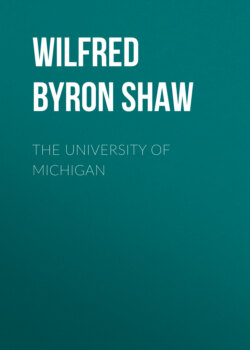Читать книгу The University of Michigan - Wilfred Byron Shaw - Страница 12
На сайте Литреса книга снята с продажи.
Оглавлениеnot only publicly preached, but otherwise openly advocated the doctrine called "the higher law," a doctrine which is unauthorized by the Bible, at war with the principles, precepts and examples of Christ and his Apostles, subversive alike of civil government, civil society, and the legal rights of individual citizens, and in effect constitutes, in the opinion of this Board, a species of moral treason against the Government.
This resolution seems to have expressed the real sentiment of the Regents; but the actual measure passed was a resolution declaring, that in view of the fact that a new Board of Regents was to take charge and appoint a President, it was expedient that the terms of Professors Williams, Whedon, and Agnew terminate at the close of the year. This was an out and out partisan matter, as there was no reason for such action inherent in the change of the governing body, particularly as it did not affect two members of the Faculty who had avoided participation in this family jar. The new Board chose, however, to act upon it and the three resignations were accepted. Professor Williams was later reappointed, as he had apparently taken a minor part in the opposition to Professor Ten Brook. This whole episode was most unfortunate and was brought about by the lack of a strong guiding administrative policy. Professor Ten Brook in his later review generously says of these men: "A stronger body of men of the same number was probably never associated in such an opening enterprise," and again, "We should find that their merits would be magnified and their mistakes diminished by a consideration of the complicated, and till then unknown difficulties with which they had to contend."
With a Chancellor to guide and direct the Faculty and to exert, on occasion, a restraining hand, a large part of these troubles might have been avoided. The Regents had early discovered their dependence upon the whims of the Legislature, particularly in financial matters, while the Superintendent of Public Instruction was given too much authority. In fact, a Committee of the Legislature appointed as early as 1840 stated in its report: "A Board of experienced Regents could manage the funds and machinery of the University better than any Legislature; and the Faculty could manage the business of education—the interior of a College—better than any Regents."
This was becoming recognized; the University's difficulties only emphasized what had become a general opinion. Accordingly the sections of the new Constitution of 1850 relating to the University were thoroughly discussed in the Convention; with the result that certain new provisions were incorporated which gave the University of Michigan a unique standing among state universities. Particularly important were the measures relating to the Board of Regents. In the first place, it was provided that they should be elected by the people, one for each judicial district, and at the same time the judges of each circuit were elected. Ten years later the latter provision was changed so that the number of Regents was definitely fixed at eight; two to be elected every two years at the regular election of the justices of the Supreme Court. In the second place, it was provided that while the Regents should have only general supervision of the University, they should have the direction and control of all expenditures from the University interest fund. These provisions were far-reaching. They made the Board of Regents a constituent part of the State Government, on an equality as regards powers with the Governor, the Legislature, and the Supreme Court.
From the time this action went into effect we may date the larger growth of the University. The selection of the Regents is as far removed from political influence as it is possible to make it under our electoral system, and they are given absolute control of the income of the University and the appropriations of the Legislature, once they are made; provided of course they are used for the purposes designated.
A further provision of the Constitution specified the immediate appointment of a President. The old plan was not considered suitable for an American college. This sentiment was so strong that the Convention was unwilling to leave this matter to the discretion of the Regents and therefore they made action imperative. All that was necessary now was the adaptation of the organic Act of the University to the new Constitution. This was accomplished on April 8, 1851, when a new Act was adopted, in essentials far simpler and more general in its terms than the old one, which left the University free to enter upon the remarkable growth and expansion which began with the administration of President Tappan.
